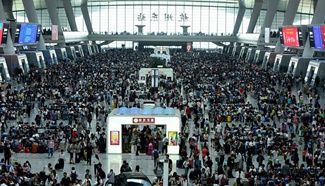CAIRO, Oct. 3 (Xinhua) -- An official with the Food and Agriculture Organization (FAO) of the United Nations said here on Monday that climate change is one of the most formidable challenges facing humanity.
The comments of Abdessalam Ould Ahmed, FAO's assistant director-general and regional representative for the Near East and North Africa, came during the inauguration of the Pre-COP22 Dialogue for Countries of the League of Arab States on the Intended Nationally Determined Contributions (INDCs) and Climate Finance at the Arab League's headquarters in Cairo that will last for two days.
"Our region, one of the most arid and water scarce regions in the world, is particularly vulnerable to climate change impacts," he addressed the meeting.
Despite massive investments in agriculture water, Ahmed said, per capita fresh water availability has declined by two third over the last 40 years and is expected to decline by another 50 percent by 2050, as a result of rapid population growth as well as the pressure on both the level and quality of water supply.
"With higher temperatures and reduced rainfall, the region will be highly vulnerable to land degradation and desertification," he stressed.
He added that this meeting is part of a series of consultations initiated by FAO in collaboration with the League of Arab States (LAS), the Arab Maghreb Union (UMA) and the governments of Egypt and Morocco to better understand countries' visions and pledges to address climate change as they relate to agriculture and food security.
"The meeting in the LAS will specifically discuss the INDC`s agricultural related issues and priority areas where FAO can assist countries of the region to strengthen their adaptation capacities to climate change," he said.
The UN official said that overall climate change will reduce food availability because of its impact on agriculture production, adding that it will affect access to food because of its negative impact on rural population income and on poverty.
"It will impact food utilization, because less water in rural areas means greater risks of water contamination," he revealed.
Climate change is likely to increase the dependency of the region on imports as well as the instability of local production because of the increased frequency of droughts, he said.
"Evidence from worldwide studies suggests that countries that pursue sustainable water resource management and agriculture strategies are better able to wither the impacts of climate change," Ould Ahmed explained.
He stressed that mismanagement of natural resources and climate change are likely to contribute to instability and protracted crisis.
"It is therefore imperative for the region to implement now a comprehensive reform agenda to put firmly the water and agriculture sectors on the path of sustainability and adapt to the likely impacts of climate change," he said.
Ould Ahmed said there will be no improved food security and no eradication of poverty in our region without adaptation to climate change and vice-versa.










